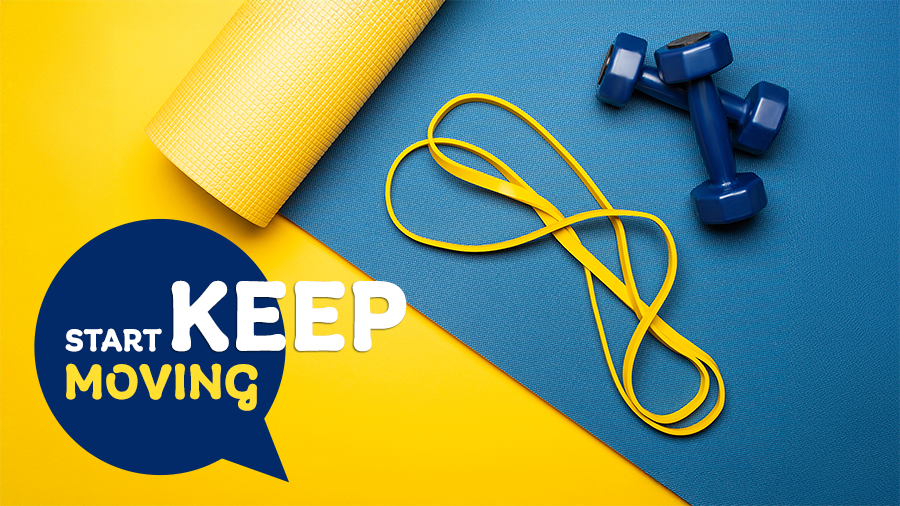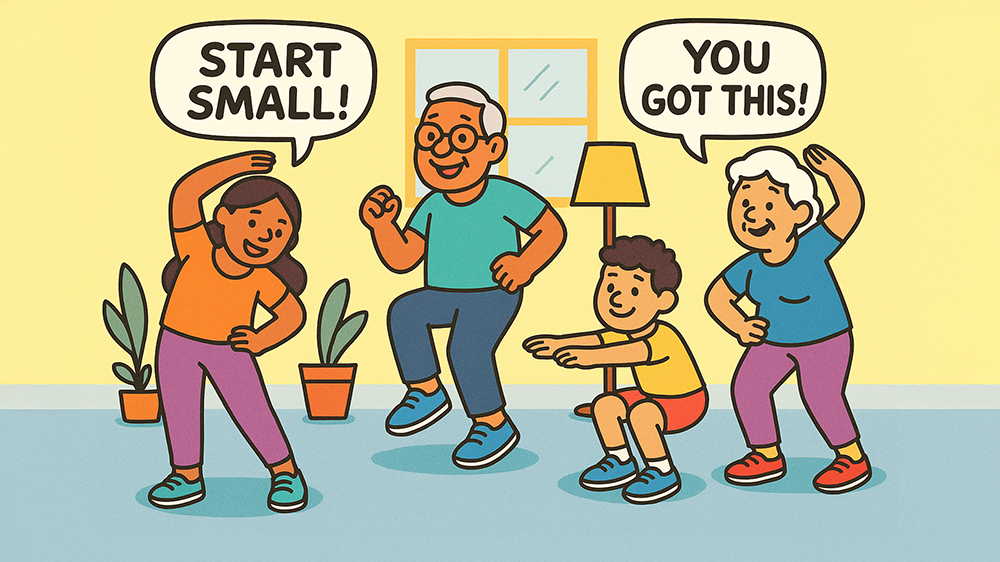
Starting a fitness journey can feel overwhelming—especially if you’re brand new or getting back into it after a break. But here’s the good news: you don’t need a gym, fancy equipment, or hours of free time to begin. These easy beginner workouts are simple, effective, and perfect for building a healthy habit that sticks.
Whether you’re short on time, unsure where to start, or just want something approachable, this guide will help you move with confidence. Let’s get started!
Why Exercise Is Important for Beginners: Boost Your Health and Mood
Exercise isn’t just about how you look—it’s about how you feel. When you start moving, even a little, you unlock powerful health benefits, both physical and mental:
- Boost your mood: Physical activity increases endorphins—your brain’s natural feel-good chemicals—which help reduce stress and anxiety, according to the American Psychological Association.
- Increase your energy: Consistent movement helps your body become more efficient, so daily tasks feel easier, as noted by the Mayo Clinic.
- Improve sleep: Gentle exercise during the day can help you fall asleep faster and sleep more deeply at night, reports the Sleep Foundation.
- Support your heart and bones: Movement strengthens your cardiovascular system and bones, according to the National Institute on Aging.
Note: If you have any medical conditions or haven’t been active recently, it’s a good idea to check with your doctor before beginning these beginner workouts.
Let’s Bust 3 Fitness Myths That Are Keeping You from Getting Started Today
Don’t let these common myths stop you from starting your fitness journey today. Here are 3 myths that are holding you back—and the truth you need to know to get moving!
Myth #1: “You Have to Spend Hours at the Gym”
You don’t need long, grueling workouts to get results. A quick 20-minute session is enough to build momentum.
The Truth: Short, regular workouts can boost energy, strength, and confidence—without taking over your schedule.
Myth #2: “You Need Fancy Equipment to Get Fit”
You already have what you need—your own body!
The Truth: Bodyweight moves like squats, push-ups, and lunges can be just as effective as gym machines. The DAREBEE workout library is packed with free, no-equipment workouts for every fitness level.
Myth #3: “You Have to Push Yourself Hard from Day One”
All-out effort on day one is a fast track to burnout—or injury.
The Truth: Start light and build gradually. Staying consistent matters more than starting intense.
7 Beginner Workouts That Actually Work (No Equipment Needed)

These simple exercises can help you build strength, improve balance, and boost endurance—without leaving your house or signing up for a gym membership.
1. Walking or Light Jogging: Easy Cardio That Fits Into Your Day
Walking is one of the best ways to ease into exercise. It’s low-impact, free, and can be done anywhere—inside or outside. As the Mayo Clinic explains, even a brisk walk improves cardiovascular fitness and energy.
How to start: Try walking for 10–20 minutes a day. As you build stamina, add time or try gentle jogging intervals.
2. Bodyweight Basics: Build Strength Without Weights
You don’t need any equipment to get stronger—just your body and a little space.
Try these exercises:
- Squats: Stand tall, then bend your knees and lower like you’re sitting in a chair.
- Lunges: Step forward, bend both knees, and return to standing.
- Push-ups: Start on your knees or against a wall if needed, and lower your chest with control.
For routines that walk you through each step, check out the DAREBEE beginner workouts.
3. Gentle Yoga or Stretching: Flexibility and Calm in One
Yoga is great for flexibility and stress relief. It also helps improve posture and balance. According to Harvard Health, yoga supports physical health while easing mental stress.
How to start: Follow a 10-minute beginner workout video or stretch gently each morning. Focus on simple poses like Downward Dog, Cat-Cow, and Child’s Pose.
4. Light Strength Training: Use Small Weights or Resistance Bands
Strength training builds muscle and protects your joints. Start light and build up as you gain confidence.
How to start: Try 1–3 pound dumbbells or resistance bands. Do simple exercises like bicep curls, triceps extensions, and seated rows. The National Institute on Aging offers routines specifically designed for beginners.
5. Dance or Aerobics: A Fun Way to Get Moving
Put on your favorite music and start dancing. It’s fun, lifts your mood, and counts as great cardio.
How to start: Follow a beginner-friendly dance or low-impact aerobics video. Even 15 minutes can get your heart rate up. The American Heart Association highlights dancing as a powerful heart-healthy activity.
6. Swimming: A Full-Body Workout with Low Impact
Swimming is perfect for people with joint concerns or those looking for gentle cardio. According to the American Heart Association, swimming is an excellent way to meet physical activity guidelines.
How to start: Swim at your own pace using simple strokes. Check if your local pool offers beginner lessons.
7. Tai Chi: Mindful Movement That Builds Balance
This slow, flowing practice helps reduce stress, improve balance, and increase body awareness. The National Institute on Aging describes Tai Chi as a gentle, joint-friendly way to stay active and focused.
How to start: Join a local class or try a video online. Begin with simple moves like “Cloud Hands” or “Parting the Horse’s Mane.”
Stick with It: How to Stay Consistent
Starting is important—but sticking with it is what brings real change. Here’s how to make exercise part of your daily life:
- Start small: Aim for 10–20 minutes a day. It’s okay to keep it simple.
- Make a schedule: Set a regular time each day so it becomes routine.
- Track your wins: Use a journal or app to log your activity. Seeing progress feels great!
Final Thought: You Can Do This
Starting a fitness routine doesn’t have to be hard or intimidating. You don’t need a gym or a perfect plan—just a willingness to move. Start small, keep showing up, and celebrate every step forward. You’ve got this! And as always, don’t forget to S.U.N (Stay Uplifted Naturally)!
Disclaimer
Welcome to S.U.N! Just a quick note: we’re here to share helpful information, but we’re not a replacement for medical, legal, or other professional advice. Our content is meant to support you, not take the place of medical or mental health treatment. If you think you might have a condition, please see a professional. Stay well!
